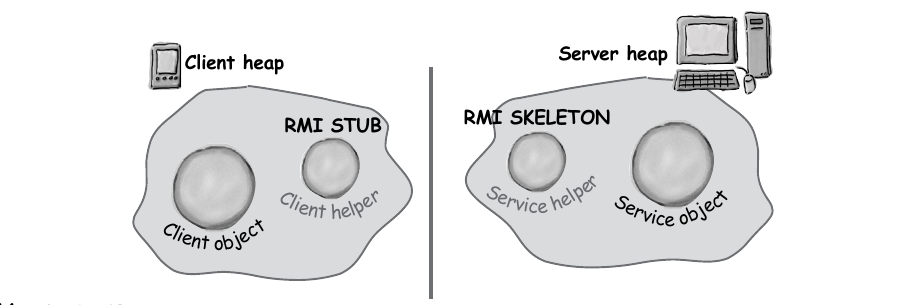RMI (Remote Method Invocation)
Concept
RMI helps you to remotely invoke a method from another machine

Provides 2 protocols
- JRMP (native)
- For Java-to-java
- CORBA (Common Object Request Broker Architecture)
- For Java to something else (more painful because you have to convert)

Example
Serverside
public static void main(String[] args) throws RemoteException {
System.setProperty("java.security.policy", "file:./.java.policy");
System.setSecurityManager(new SecurityManager());
try {
Registry registry = LocateRegistry.createRegistry(8080);
registry.bind("myFunction", new RemoteFunction());
} catch (RemoteException | AlreadyBoundException e) {
throw new RuntimeException(e);
}
System.out.println("Hello world");
}
RemoteFunction.java
public class RemoteFunction extends UnicastRemoteObject implements MyRemote {
public RemoteFunction() throws RemoteException {
}
@Override
public String sayHello() throws RemoteException {
System.out.println("Saying hello from remote");
return "Saying hello";
}
}
MyRemote.java
public interface MyRemote extends Remote {
String sayHello() throws RemoteException;
}
java.policy
grant codeBase "file:/-" {
permission java.security.AllPermission;
};
ClientSide
public class App {
@SuppressWarnings("removal")
public static void main(String[] args) {
System.setProperty("java.security.policy", "file:./java.policy");
System.setSecurityManager(new SecurityManager());
try {
Registry registry = LocateRegistry.getRegistry("192.168.1.120", 8080);
MyRemote myRemote = (MyRemote) registry.lookup("myfunction");
myRemote.sayHello();
} catch (RemoteException | NotBoundException e) {
// TODO Auto-generated catch block
e.printStackTrace();
}
}
}
Java policy is the same as the above
Note: Both server and the client needs to have the same folder structure. And sometimes we need to configure a certain properties for it too work. This is too much caveats as modern solution will just use REST and execute over HTTP.